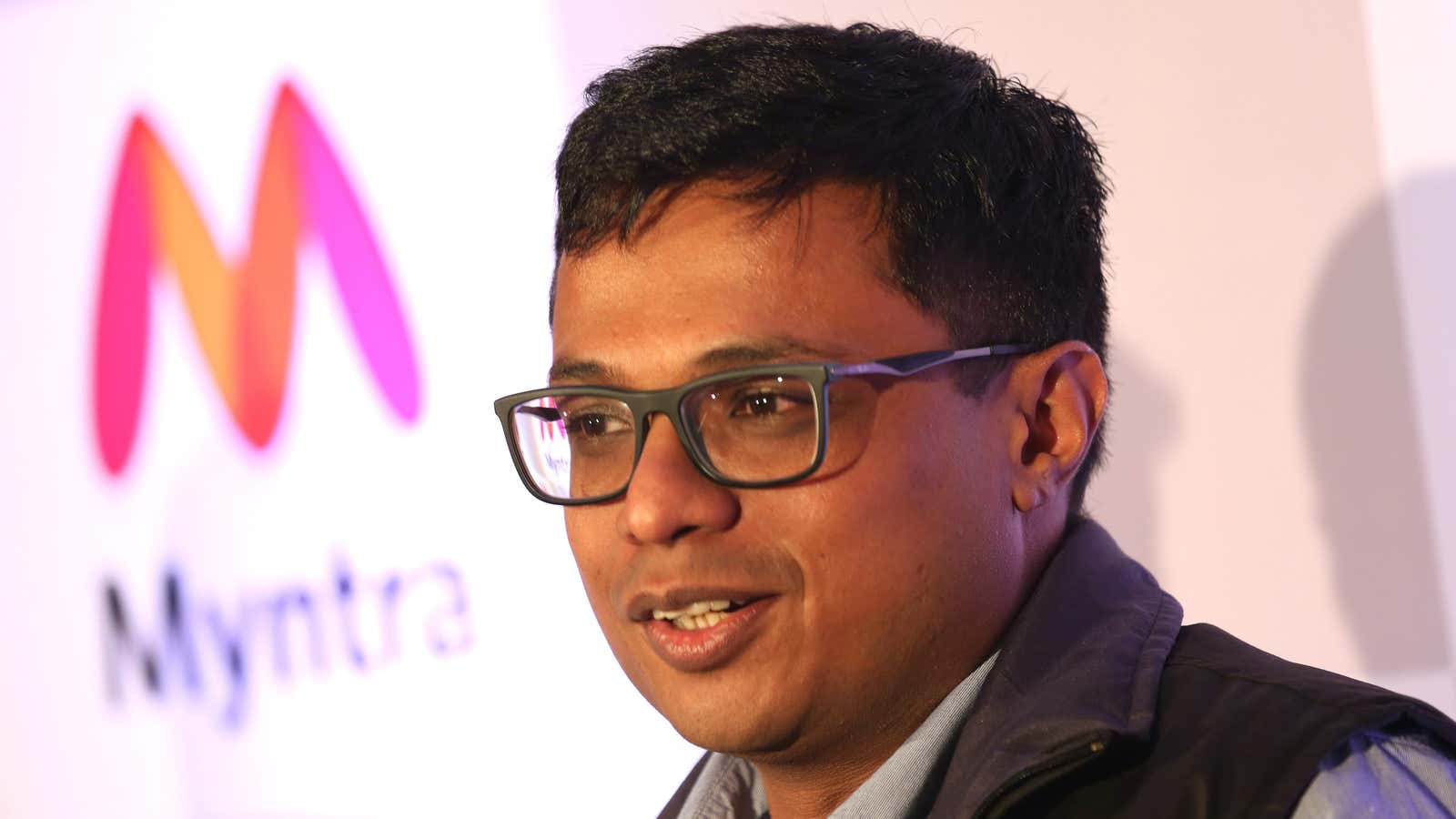Some of India’s biggest entrepreneurs are serious about getting the country to shut out foreign rivals.
Nearly a year after he first mentioned the need for protectionist policies like those in China, Sachin Bansal, one of India’s most successful young entrepreneurs, has brought together like-minded people to form a lobby group called Indiatech.org.
The Flipkart founder, along with a host of other startups and investors, is launching the body representing the interests of local ventures. The group will rally against deep-pocketed foreign rivals as India’s e-commerce industry heads towards explosive growth. While many key players are siding with Bansal, many others are also making a case for global competition.
Bansal has not yet outlined how Indiatech.org will work, but source-based media reports suggest that he has roped in Gyanendra Badgaiyan, a former Indian Administrative Service (IAS) officer and economist, to head the group.
Others who have joined the lobby are ride-hailing unicorn Ola, travel portal MakeMyTrip, online classifieds platform Quikr and messenger app Hike, VCCircle reported. Flipkart and MakeMyTrip declined to offer comments for this story; others didn’t respond to emails from Quartz.
Indiatech.org has also found supporters in Indian venture capital (VC) firm Kalaari Capital, led by Vani Kola, and foreign players such as Japan’s Softbank and US-based Matrix Partners. In response to an emailed questionnaire, a Softbank spokesperson told Quartz:
SoftBank is one of the several other investors including Matrix and Kalaari and Indian internet businesses such as Ola, Flipkart and Hike, who are supporting Indiatech. Our intent is to work with the government to support the development of the rapidly evolving internet ecosystem in the country and we hope the organisation would facilitate this.
Softbank is an investor in Flipkart, which competes with American e-tail giant Amazon. Matrix Partner backs Ola, which closely competes with San Francisco-based Uber.
Saving themselves
Indian tech startups are battling deep-pocketed global players that have entered the fray with years of international experience.
For instance, even though it entered India five years after Flipkart was founded in 2007, Amazon has by now reached nearly the same scale as the former. And while, in 2016, the Bengaluru-based firm struggled to raise funds, Amazon had no such constraints.
It is this dearth of capital that led Ola co-founder Bhavish Aggarwal to gun for protectionism last year. “It is not just about innovation and consumers. Indian markets are behind because there is no local capital available, so Indian companies have to look abroad for capital… Whoever has higher access to capital often ends up succeeding,” he said in December 2016. “Global companies can raise capital much easier than local Indian companies can, because they have access to many more markets than we do, and this ends up distorting competition.”
Bansal also said that foreign companies succeed through “capital dumping, predatory pricing or anti-WTO” practices, drawing from their other profitable markets. Therefore, Bansal argued, India needs to follow in China’s footsteps and “tell the world we need your capital, but we don’t need your companies.”
Tricky spot
Yet, it is important to note that ventures owned by Bansal and Aggarwal themselves may not be truly “Indian.”
Flipkart, for one, is registered in Singapore, and Ola is backed by foreign investors like Softbank and China-based Tencent, which hold a significant stake in the company. These firms, however, insist they are Indian as their founders and management are based in the country.
That said, Amazon India is headed by a local, Amit Agarwal, and the company has a strong employee base in the country. Uber has also strengthened its local leadership in India in recent years. “Other startups are as foreign in their investment profile as any other company. So I really don’t understand this,” Amazon’s Agarwal told business channel ET Now on Oct. 27.
Vijay Shekhar Sharma, founder of payments startup Paytm, also questioned this nationalist logic. “The same firm which is worried about ‘international companies’ is actually international, internationally funded, and internationally-owned by shareholders,” he said at the India Economic Summit 2017 in early October.
Meanwhile, the Indian IT industry body, NASSCOM, told Quartz that it welcomes an e-commerce lobby to ensure a “level-playing-field, access to capital, infrastructure, technology, mentorship.” However, it remains a steadfast supporter of global competition.
“We do not believe in trade barriers like China has set up. Competition has to happen,” said Prasanto K Roy, the head of NASSCOM’s internet, mobile and e-commerce council, recognising that over two-thirds of the business in India’s $150 billion IT industry comes from global clients. “This is the 21st century.”
